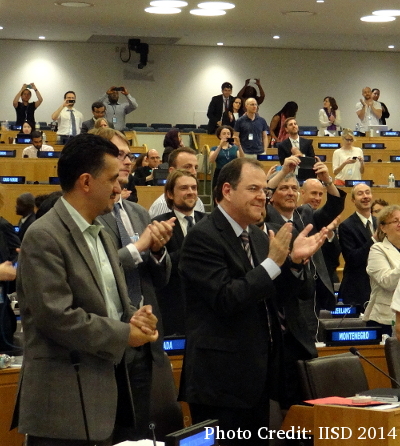
Established in January 2013, the UN SDGs Open Working Group
(SDGs OWG) was tasked with proposing an aspirational set of goals and targets to the UN General Assembly by September
2014. The emerging Sustainable Development Goals (SDGs) are to officially
succeed the Millennium Development Goals (MDGs) at a special MDGs-SDGs Summit
in September 2015.
The SDGs OWG adopted a highly innovative and collaborative
approach in which 70 UN Member States were grouped into “troikas”
sharing a total of 30 seats. After holding eight thematic sessions between
March 2013 and February 2014, the Co-Chairs of the SDGs OWG (H.E. Mr.
Csaba Kõrösi, Permanent Representative of Hungary, and H.E. Mr.
Macharia Kamau, Permanent Representative of Kenya) released 19
focus areas for consideration in the SDGs.
In March 2014, the Open Working Group transitioned to a
negotiation phase, holding five sessions between March and July 2014. After 18
months and a final session that featured a 16-hour marathon of overnight
negotiations, the Group approved by consensus 17 goals and 169 targets.
Download: Final Report of
the SDGs Open Working Group (PDF)
List of Goals proposed by the SDGS Open
Working Group
1. End poverty in all its forms
everywhere
2. End hunger, achieve food security
and improved nutrition, and promote sustainable agriculture
3. Ensure healthy lives and promote
well-being for all at all ages
4. Ensure inclusive and equitable
quality education and promote life-long learning opportunities for all
5. Achieve gender equality and empower
all women and girls
6. Ensure availability and sustainable
management of water and sanitation for all
7. Ensure access to affordable,
reliable, sustainable, and modern energy for all
8. Promote sustained, inclusive and
sustainable economic growth, full and productive employment and decent work for
all
9. Build resilient infrastructure,
promote inclusive and sustainable industrialization and foster innovation
10. Reduce inequality within and among
countries
11. Make cities and human settlements
inclusive, safe, resilient and sustainable
12. Ensure sustainable consumption and
production patterns
13. Take urgent action to combat
climate change and its impacts
14. Conserve and sustainably use the
oceans, seas and marine resources for sustainable development
15. Protect, restore and promote
sustainable use of terrestrial ecosystems, sustainably manage forests, combat
desertification, and halt and reverse land degradation and halt biodiversity
loss
16. Promote peaceful and inclusive
societies for sustainable development, provide access to justice for all and build
effective, accountable and inclusive institutions at all levels
17. Strengthen the means of
implementation and revitalize the global partnership for sustainable
development
The General Assembly will continue SDG
negotiations within its traditional member-state system of representation (i.e.
removing the “troikas”). Negotiations will be based on the
Secretary-General’s Report in Q4 2014, culminating in a MDGs-SDGs Summit in
September 2015.
SDG 11. Make Cities & Human Settlements
inclusive, Safe, Resilients and Sustainable
11.1 By 2030, ensure access for all to adequate, safe and affordable
housing and basic services, and upgrade slums
11.2 By 2030, provide access to safe, affordable, accessible and
sustainable transport systems for all, improving road safety, notably by
expanding public transport, with special attention to the needs of those in
vulnerable situations, women, children, persons with disabilities and older
persons
11.3 By 2030 enhance inclusive and sustainable urbanization and
capacities for participatory, integrated and sustainable human settlement
planning and management in all countries
11.4 Strengthen efforts to protect and safeguard the world’s cultural
and natural heritage
11.5 By 2030 significantly reduce the number of deaths and the number
of affected people and decrease by y% the economic losses relative to GDP
caused by disasters, including water-related disasters, with the focus on
protecting the poor and people in vulnerable situations
11.6 By 2030, reduce the adverse per capita environmental impact of
cities, including by paying special attention to air quality, municipal and
other waste management
11.7 By 2030, provide universal access to safe, inclusive and
accessible, green and public spaces, particularly for women and children, older
persons and persons with disabilities
Means of Implementation
11.a Support positive economic, social and environmental links between
urban, peri-urban and rural areas by strengthening national and regional
development planning
11.b By 2020, increase by x% the number of cities and human settlements
adopting and implementing integrated policies and plans towards inclusion,
resource efficiency, mitigation and adaptation to climate change, resilience to
disasters, develop and implement in line with the forthcoming Hyogo Framework
holistic disaster risk management at all levels
11.c Support least developed countries, including through financial and
technical assistance, for sustainable and resilient buildings utilizing local
materials.
* To read more from its original source,
please click here.


